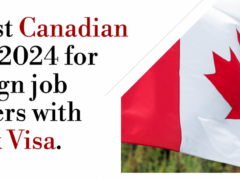Scholarships in Canada For International Students
Overview of Scholarships in Canada for International Students
Welcome to the land of opportunities! Canada, known for its diverse culture and top-quality education system, is a prime destination for international students seeking academic excellence. But what truly sets Canada apart is its generous scholarship programs aimed at attracting global talent. From coast to coast, Canadian universities, government bodies, and private organizations offer a wide range of scholarships to international students. These scholarships are designed to cover various expenses, from tuition fees to living costs, and sometimes even travel expenses.
These financial aids are not just about easing the financial burden; they’re gateways to exceptional educational experiences in some of the world’s most prestigious institutions. Whether you’re an undergraduate, a master’s candidate, or a doctoral researcher, there’s a scholarship in Canada tailored to your academic aspirations. The offerings range from merit-based scholarships, which reward academic and extracurricular achievements, to need-based grants that assist students from lower economic backgrounds. Furthermore, there are scholarships specifically aimed at certain regions, minorities, or fields of study, ensuring a diverse and inclusive educational landscape.
Importance of Scholarships for Educational and Cultural Exchange
Scholarships do more than just fund education; they bridge cultural gaps and foster international collaboration. They attract a mosaic of minds from around the globe, enriching Canadian campuses with a multitude of perspectives and experiences. This cultural exchange is pivotal in today’s globalized world. It promotes understanding and tolerance, prepares students to work in diverse environments, and builds a global network of future leaders and innovators.
Moreover, for many international students, these scholarships are the stepping stones to realizing their dreams. They open doors to cutting-edge research, quality teaching, and unparalleled academic resources, setting the foundation for a successful career. By reducing the financial barriers, scholarships enable students to fully immerse themselves in their studies and campus life, enhancing their learning experience and personal growth.

Understanding Scholarships in Canada
When considering higher education in Canada, understanding the landscape of scholarships available is crucial. Scholarships in Canada are diverse, catering to a wide range of students with different backgrounds and achievements. Let’s break down the types of scholarships to better understand your options.
Types of Scholarships
- Merit-based Scholarships
- Defining Merit-based Scholarships: Merit-based scholarships are awarded to students who demonstrate exceptional academic achievements, leadership qualities, or other talents. These scholarships are highly competitive and prestigious, recognizing the hard work and dedication of students.
- Criteria for Selection: Typically, the criteria include a high GPA, outstanding performance in certain subjects, or exceptional skills in areas such as sports, arts, or community service. Some may require essays or personal statements where you showcase your accomplishments.
- Examples: Scholarships like the University of Toronto’s Lester B. Pearson International Scholarship fall under this category, offering full tuition coverage to students who demonstrate exceptional academic prowess and creativity.
- Need-based Scholarships
- Understanding Need-based Scholarships: Unlike merit-based scholarships, need-based scholarships are designed for students who require financial assistance to pursue their education. These scholarships aim to ensure that financial barriers do not impede talented students from achieving their academic goals.
- Determining Eligibility: Eligibility is often determined by the student’s and their family’s financial situation. Applicants may need to submit documents such as family income statements to qualify.
- Impact on Students: Need-based scholarships can be life-changing for students who face financial constraints, providing them the opportunity to attend universities that may otherwise be beyond their financial reach.
- Specific Group Scholarships
- Purpose and Scope: These scholarships are tailored for students from specific demographics, backgrounds, or fields of study. They aim to promote diversity and equal opportunity in education.
- Categories: This can include scholarships for international students from certain countries, for indigenous students, women in STEM fields, or students pursuing specific disciplines like engineering or the arts.
- Advantages: Specific group scholarships not only provide financial assistance but also create support networks and communities for students who might otherwise feel underrepresented or isolated in their academic journey.
How to Find Scholarships
Navigating the world of scholarships can be overwhelming, but with the right approach and resources, it becomes a manageable and even exciting journey. Finding the perfect scholarship requires a strategic research process. Let’s explore the most effective ways to search for Scholarships in Canada For International Students.
Researching Scholarships
- University Websites
- Starting Point: University websites are a goldmine of information for scholarships. Each Canadian university typically has a dedicated section for financial aid and scholarships on its website. Here, you can find detailed information about scholarships specific to that institution.
- What to Look For: Pay attention to scholarships for international students, which may have different criteria or application processes. Look for both merit-based and need-based options.
- Insider Tip: Don’t hesitate to reach out to the university’s financial aid office if you have questions. They can provide valuable insights and even alert you to scholarships that aren’t widely advertised.
- Government Portals
- Federal and Provincial Opportunities: The Canadian government, both at the federal and provincial levels, offers a variety of scholarships for international students. These can be found on official government websites.
- Types of Scholarships: These scholarships can range from those supporting short-term exchange programs to full degrees at undergraduate or graduate levels.
- Benefits of Government Scholarships: Government-funded scholarships are usually comprehensive and may include tuition fees, living expenses, and sometimes travel costs.
- Scholarship Databases
- A Wealth of Options: Online scholarship databases are an efficient way to search for scholarships. These databases allow you to filter scholarships by criteria such as study level, nationality, and field of study.
- Popular Databases: Platforms like ScholarshipsCanada.com, InternationalScholarships.com, and EduCanada.ca provide extensive lists of scholarships, grants, and bursaries available to international students in Canada.
- Staying Organized: When using these databases, it’s beneficial to create a spreadsheet or a list to keep track of scholarships that you are eligible for, their deadlines, and application requirements.
Eligibility Criteria for Scholarships
Securing a scholarship in Canada, much like unlocking a treasure chest, requires fitting the right key into the lock. That key is understanding and meeting the eligibility criteria. Let’s break down these criteria to help you increase your chances of securing a scholarship.
Academic Excellence
- Key to Success: Academic excellence is the cornerstone of most scholarships. This goes beyond just having good grades; it encompasses a strong overall academic record.
- What’s Evaluated: Scholarship committees often look at your GPA, grades in specific subjects relevant to your intended field of study, and any academic awards or honors you’ve received.
- Pro Tip: Maintain a strong academic performance throughout your school years. If you’re already in university, focus on excelling in your coursework and seek opportunities to showcase your academic skills, such as through research projects or academic competitions.
Extra-Curricular Activities
- More Than Just Grades: While academic performance is crucial, scholarship committees also value well-rounded candidates. This is where extra-curricular activities come into play.
- Types of Activities: These can include sports, arts, volunteer work, leadership roles in school clubs, or community service. The goal is to demonstrate your skills, interests, and commitment outside the academic realm.
- Balancing Act: Engage in activities that genuinely interest you and where you can make a significant contribution or leadership impact. This will naturally reflect in your scholarship application, showcasing your passion and dedication.
Specific Eligibility Requirements
- Tailored Criteria: Some scholarships have specific criteria that cater to certain demographics, fields of study, or career aspirations. This can range from scholarships for students in STEM fields to those aimed at promoting cultural diversity.
- Research is Key: Carefully read the eligibility requirements for each scholarship. This might include prerequisites like a particular major, a specific country of origin, or an intention to work in a certain field after graduation.
- Aligning Your Goals: Identify scholarships whose criteria align closely with your background, interests, and future plans. This strategic approach will not only increase your chances of success but also help you find scholarships that genuinely match your academic and professional journey.
Application Process for Scholarships
Embarking on the scholarship application journey is akin to preparing for a key milestone in your academic career. It’s a process that demands careful planning, attention to detail, and a clear understanding of what scholarship committees are looking for. Let’s navigate through the steps to ensure your application stands out.
Preparing Your Application
- Required Documents
- Gathering Essentials: The backbone of any scholarship application is the documentation. This usually includes your academic transcripts, proof of enrollment (if applicable), and identification documents.
- Tailoring to Requirements: Each scholarship may have specific requirements, such as portfolios for art scholarships or research proposals for academic grants. Ensure you’re fully aware of and comply with these unique requirements.
- Organized and On-Time: Maintain a checklist and a timeline. Organizing your documents and submitting your application well before the deadline can save you from last-minute hiccups and demonstrate your professionalism and commitment.
- Writing a Compelling Personal Statement
- Your Story, Your Voice: The personal statement is your opportunity to shine – to convey who you are beyond grades and accolades. It’s where you tell your unique story, your aspirations, and how the scholarship will help you achieve your goals.
- Key Elements: Address your motivation for choosing your field of study, your future objectives, and how your experiences (academic and non-academic) have shaped your journey. It’s important to be authentic and reflective.
- Making It Stand Out: Keep the tone engaging and personal. Use examples to illustrate your points, and don’t shy away from sharing challenges you’ve overcome. This adds depth to your character and resilience.
- Getting Recommendations
- Selecting Your Advocates: Letters of recommendation are crucial. Choose individuals who know you well – a teacher, a mentor, an employer – and can vouch for your abilities, character, and suitability for the scholarship.
- Guidance and Clarity: Provide your recommenders with clear information about the scholarship and what it entails. Let them know why you think you’re a good fit, and what aspects of your relationship with them you’d like them to highlight.
- Timeliness and Courtesy: Request recommendations well in advance. Give your referees ample time to write a thoughtful letter. Remember to follow up with a thank you note – it’s not only polite but fosters good relationships for the future.
Top Scholarships in Canada For International Students
Canada, a land renowned for its academic excellence and diverse culture, offers a myriad of scholarship opportunities for international students. These scholarships are a gateway to high-quality education, providing financial assistance and sometimes even covering living expenses and travel costs. Let’s explore some of the top scholarships available to international students in Canada.
Government-Funded Scholarships
- Vanier Canada Graduate Scholarships
- Prestige and Purpose: The Vanier Canada Graduate Scholarships are among the most prestigious in Canada. Aimed at doctoral students, these scholarships seek to attract and retain world-class doctoral students who demonstrate both leadership skills and a high standard of scholarly achievement.
- Financials and Duration: Valued at $50,000 per year for three years, these scholarships are substantial in supporting your studies.
- Areas of Focus: The scholarships are available to students in three primary areas of research: Health Research, Natural Sciences and/or Engineering, and Social Sciences and Humanities.
- Banting Postdoctoral Fellowships
- For the Aspiring Researchers: The Banting Postdoctoral Fellowships program provides funding to the very best postdoctoral applicants who will positively contribute to Canada’s economic, social, and research-based growth.
- Value and Scope: The fellowships offer $70,000 per year for two years and are open to both Canadian and international researchers.
- Interdisciplinary and Collaborative: These fellowships encourage interdisciplinary research and professional development, making it an excellent opportunity for those seeking a comprehensive postdoctoral experience.
University-Funded Scholarships
- University of Toronto Lester B. Pearson Scholarship
- Full Coverage and Recognition: This scholarship program is designed to recognize international students who demonstrate exceptional academic achievement and creativity, and who are recognized as leaders within their school.
- Benefits: The scholarship covers tuition, books, incidental fees, and full residence support for four years.
- A Holistic Approach: The selection process is holistic, considering not only academic achievements but also the impact the candidate has had on the life of their school and community.
- University of British Columbia Scholarships for International Students
- Diverse and Inclusive: The University of British Columbia offers a range of scholarships for international undergraduate and graduate students.
- Scholarship Types: These include merit-based awards, awards based on financial need, and awards for specific student groups.
- Opportunities for Many: With a broad range of scholarships, UBC aims to support a diverse international student body and their varied academic and extracurricular pursuits.
Tips for Successful Scholarship Applications
Navigating the scholarship application process can feel like steering a ship through uncharted waters. To successfully reach your destination – winning that coveted scholarship – it’s crucial to understand the nuances of the journey. Let’s look at some essential tips that can increase your odds of success.
Understanding the Selection Criteria
- Know What They’re Looking For: Each scholarship has its own set of selection criteria. It’s vital to understand these criteria thoroughly. Are they looking for academic excellence, leadership qualities, community involvement, or a combination of these?
- Aligning Your Application: Once you understand the criteria, tailor your application to highlight how you meet them. Use specific examples from your academic, personal, and professional life to demonstrate your suitability.
- Beyond the Basics: Remember, many applicants will meet the basic criteria. Stand out by showcasing unique aspects of your background or experience that align with the scholarship’s values and goals.
Importance of Networking
- Building Connections: Networking can play a critical role in your scholarship journey. Engage with alumni of the scholarship program, current recipients, or the scholarship committee if possible.
- Gathering Insights: These connections can provide invaluable insights into the application process and what the committee might be looking for. They can also offer advice based on their own experiences.
- Leveraging Professional Networks: If you’re applying for a field-specific scholarship, connections in that field can offer both mentorship and potential letters of recommendation.
Time Management and Deadlines
- Plan Ahead: Managing your time effectively is crucial. Create a timeline for each scholarship you’re applying to, including deadlines for the application, recommendation letters, essays, and any other required materials.
- Avoid Last-Minute Rush: Procrastination is the enemy of a strong application. Start early, and give yourself plenty of time for revisions, especially for crucial elements like personal statements and essays.
- Regular Check-Ins: Regularly check your progress against your timeline. Staying on track will reduce stress and help ensure you submit a well-crafted, thoughtful application.
Life in Canada as an International Student
Embarking on your educational journey in Canada is about more than just attending classes; it’s about immersing yourself in a new cultural and academic environment. As an international student, adapting to life in Canada involves embracing new experiences, managing your resources effectively, and taking care of your well-being. Let’s explore these aspects.
Cultural Integration
- Embracing Diversity: Canada is renowned for its multicultural society. As an international student, you’ll have the opportunity to experience a blend of cultures and customs. Participating in cultural events and festivities on and off campus can enrich your understanding and appreciation of this diversity.
- Language and Communication: While English and French are Canada’s official languages, you might encounter a variety of accents and slang. Don’t hesitate to seek language support if needed and embrace these differences as part of your learning journey.
- Building a Social Network: Engaging with fellow students, joining clubs, and being active in your academic community are great ways to build friendships and integrate into Canadian life. These connections can also offer support and guidance as you navigate your new environment.
Managing Finances
- Budgeting is Key: It’s essential to manage your finances wisely. Create a budget that includes your tuition fees, accommodation, food, transportation, and miscellaneous expenses. Be mindful of spending and look for student discounts.
- Part-time Work: Many international students take up part-time jobs to support their expenses. Check your visa conditions to understand your work entitlements and look for jobs on-campus or in the local community.
- Financial Literacy: Familiarize yourself with Canadian banking, taxes, and any financial obligations you might have as a student. This knowledge is crucial for effective financial management.
Health and Wellness
- Healthcare in Canada: Understand the healthcare services available to you as an international student. Some provinces offer health insurance coverage for students, while in others, you might need to arrange private health insurance.
- Mental Health Resources: Adjusting to a new country can be challenging. Most universities in Canada provide mental health services, including counseling and support groups. Utilizing these resources can help you maintain your mental well-being.
- Stay Active and Involved: Participating in sports, recreational activities, or fitness classes can not only keep you physically fit but also positively impact your mental health. It’s also a great way to meet new people and find a sense of community.
Challenges and How to Overcome Them
Embarking on an educational journey in a new country is an exhilarating experience, but it’s not without its challenges. International students in Canada often encounter hurdles such as language barriers, homesickness, and academic pressure. Let’s explore these challenges and discuss strategies to overcome them effectively.
Language Barriers
- Improving Language Skills: If English or French isn’t your first language, you may face difficulties with communication. To overcome this, actively practice the language. Enroll in language classes if necessary, engage in conversations with native speakers, and don’t hesitate to ask for clarifications when needed.
- Utilizing University Resources: Most Canadian universities offer language support services, including workshops, tutoring, and conversation clubs. Take advantage of these resources to enhance your language proficiency.
- Patience and Persistence: Language proficiency takes time to develop. Be patient with yourself and persist in your efforts to improve. Over time, communication will become easier and more natural.
Homesickness
- Staying Connected with Home: Thanks to technology, keeping in touch with family and friends back home is easier than ever. Regular calls, video chats, and messages can help alleviate feelings of loneliness and keep you connected with your loved ones.
- Creating a New Support Network: Building a new social circle in Canada can help you feel more at home. Join student groups, participate in campus activities, or volunteer in your community to meet new people and form friendships.
- Exploring and Adapting: Embrace the new culture and surroundings. Exploring your new city, trying local foods, and participating in Canadian traditions can help you adapt and appreciate your new environment.
Academic Pressure
- Effective Time Management: Balancing coursework, part-time jobs, and social activities can be challenging. Developing strong time management skills is key. Create a study schedule, set realistic goals, and prioritize your tasks to manage your academic workload effectively.
- Seeking Academic Support: Don’t hesitate to seek help if you’re struggling academically. Utilize your university’s academic resources, such as tutoring services, study groups, and workshops. Professors and academic advisors can also provide guidance and support.
- Self-Care and Stress Management: It’s important to take care of your mental health. Engage in activities that relax and recharge you. Exercise, hobbies, and mindfulness practices can be effective ways to manage stress and maintain a healthy balance.
Post-Scholarship Opportunities
Securing a scholarship and completing your studies in Canada is an achievement that opens doors to numerous opportunities. As an international student who has successfully navigated academic challenges, you are now poised to explore further prospects in Canada. Let’s delve into what awaits you after your scholarship period.
Career Opportunities in Canada
- Diverse Job Market: Canada’s job market is known for its diversity and inclusivity, offering opportunities in various industries. Your Canadian education and the skills you’ve acquired make you a valuable candidate in the job market.
- Work Permits for Graduates: As a graduate, you may be eligible for a Post-Graduation Work Permit (PGWP), allowing you to work in Canada for up to three years, depending on the length of your study program.
- Utilize Career Services: Most Canadian universities offer career services to help students and alumni with job placements. These services can assist with resume writing, interview preparation, and connecting you with potential employers.
Permanent Residency Options
- Pathway to Residency: Canada offers several pathways for international graduates to obtain permanent residency. Programs like the Canadian Experience Class (CEC) under the Express Entry system are popular among graduates who have gained work experience in Canada.
- Meeting the Requirements: To be eligible for permanent residency, you’ll need to meet specific requirements, such as work experience, language proficiency, and others, depending on the immigration program.
- Long-Term Planning: If your goal is to become a permanent resident, start planning early. Understand the requirements and how your time as a student and potential work experience post-graduation contribute to your eligibility.
Networking and Alumni Associations
- Building Professional Networks: Networking is crucial for career development. Engage with professionals in your field through LinkedIn, industry events, and university networking events.
- Alumni Associations: Join your university’s alumni association. These associations can be an excellent resource for professional networking, career opportunities, and staying connected with your alma mater.
- Leveraging Connections: Maintain connections with your professors, peers, and professionals you’ve met during internships or part-time jobs. These connections can provide valuable insights, advice, and potential job referrals.
Conclusion
Embarking on a journey to study in Canada with the aid of scholarships is an enriching and transformative experience. As we’ve explored, scholarships in Canada for international students come in various forms, including merit-based, need-based, and those targeting specific groups. Understanding and meeting the eligibility criteria, preparing a strong application, and being aware of the post-scholarship opportunities are key to leveraging this opportunity fully.
We delved into the essential steps of finding scholarships, highlighting the importance of thorough research through university websites, government portals, and scholarship databases. Emphasizing the eligibility criteria, we looked at academic excellence, extra-curricular activities, and specific requirements. The application process, including gathering required documents, writing a compelling personal statement, and obtaining recommendations, was discussed to help you craft a winning application.
Further, we explored life in Canada as an international student, addressing the challenges of cultural integration, managing finances, and ensuring health and wellness. Post-scholarship opportunities, such as career options, pathways to permanent residency, and the significance of networking and alumni associations, were also covered to give you a comprehensive view of your journey after the scholarship.
As we conclude, it’s clear that pursuing scholarships in Canada is not just about financial support; it’s a pathway to personal growth, academic excellence, and professional opportunities. The experiences and skills you gain in Canada will be invaluable, shaping you into a global citizen ready to contribute to the world. Apply for scholarship
So, to all aspiring international students, I encourage you to take this step towards realizing your dreams. Research diligently, prepare your applications with care, and embrace the opportunities and challenges that come with studying in Canada. Your educational journey in Canada could be the start of something extraordinary.
FAQs: Scholarships in Canada For International Students
- Are scholarships in Canada for international students fully funded? Some scholarships cover all expenses, including tuition, living costs, and sometimes travel expenses, while others may only cover a portion of these costs.
- When should I start applying for scholarships to study in Canada? It’s advisable to start researching and preparing your applications at least a year before your intended start date.
- Do I need to know French to study in Canada? Knowing French is not a requirement for all universities in Canada. However, it can be beneficial, especially if you plan to study in Quebec or other French-speaking regions.
- Can international students work in Canada while studying? Yes, international students can work up to 20 hours per week during academic sessions and full-time during scheduled breaks, like summer and winter holidays.
- Is it possible to get permanent residency in Canada after studying? Yes, international graduates can apply for permanent residency through various programs like the Canadian Experience Class, provided they meet the eligibility criteria.
Scholarships in Canada For International Students
Latest LIMA Approved Jobs in Canada
| Position | Apply Link |
| Factory Worker | Click Here |
| Supermarket Jobs | Click Here |
| Farm worker | Click Here |
| Driver | Click Here |
| Cook | Click Here |
| Production Worker | Click Here |
| Housekeeper | Click Here |
| Truck Driver | Click Here |
| Entry Level Jobs | Click Here |




